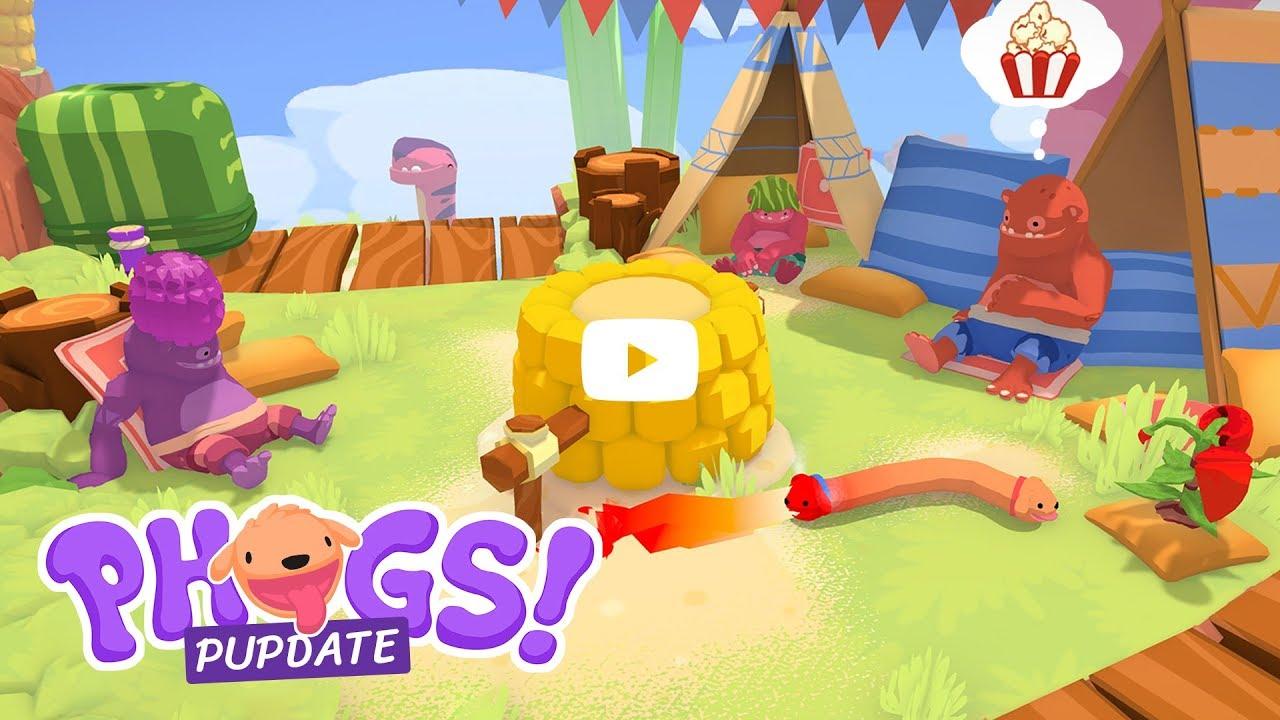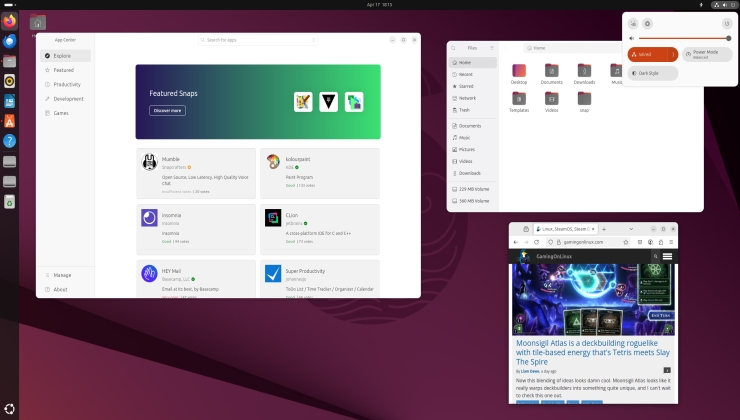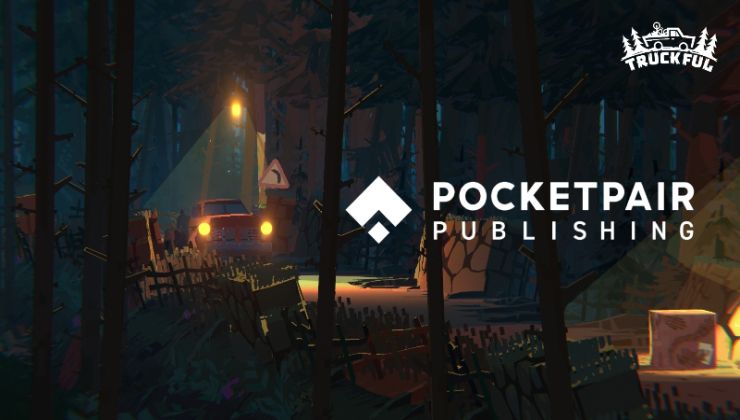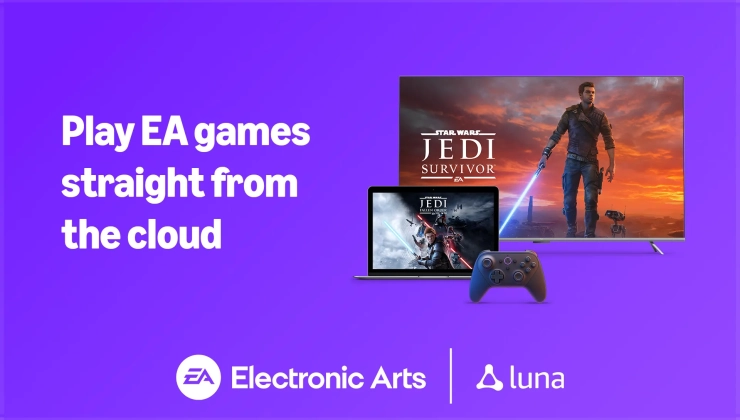As Google continue to build up Stadia, they're gradually announcing more games coming and we have another three smaller indie titles now confirmed.
The first is Cake Bash, arriving on October 15 which is a four player party game where assorted forms of cake beat each other up. It sounds pretty amusing. The Stadia trailer gave nothing other than a release date, so here's a slightly older gameplay look:

Direct Link
It's also launching on Steam but no Linux desktop support.
Features:
- Pick your favourite cake and battle in a variety of lifelike arenas with unique goals - cover yourself in sweeties or hurl fruit into a pie, there’s plenty for everyone!
- To cool down, try an assortment of minigame treats - roast perfect marshmallows, pipe the finest frosting, or be the last flan standing in Fork Knife.
- Guide your cakes through the bakery as they dress to impress the customer in Get Tasty! Buy delicious toppings in a series of games to be the chosen one...
- You could also just play your favourite mode again and again, it’s up to you!
- Compete on the same screen, find challengers online or battle well-baked bots. It’s time to get out of the oven and into the fray!
Another title announced is PHOGS!, a pretty amusing looking physics-based single-player or co-op puzzle game about a dog with two heads that flails about. No date set other than "soon".

Direct Link
It's also coming to Steam but no Linux desktop support.
Features:
- Co-operation is key - Put your heads together to solve taxing, teamwork-based puzzles.
- An epic journey - Explore 24 fantastical levels stuffed with exciting challenges and creatures to play with.
- Play YOUR way - Supporting single-player and shared-controller gameplay, plus local and online co-op, Red and Blue are always ready to play!
- A hat for every occasion - Customize your Phoggos! Find the Golden Bones hidden throughout every level to build your collection of adorable hats.
- And more to explore - The Phoggyverse contains a wealth of hidden secrets. Search far and wide to discover them all.
The third title announced is Ary and the Secret of Seasons, an award-winning adventure game following a young girl named Aryelle, or Ary, as she journeys across the great world of Valdi. No date given other than "soon".

Direct Link
Already available on Steam with no Linux desktop support.
Features:
- Rewarding exploration - Harnessing the power of the seasons, Ary can traverse sweeping landscapes in search of new destinations, solving amazing environmental puzzles to progress.
- Captivating storytelling - Ary is recruited to help the Guardians of Seasons, an old organization caught up by rigid traditions. As she ventures through uncharted locations across Valdi, Ary will discover secrets and hidden meanings behind the Guardian of Seasons.
- Dynamic environments - Manipulate the world around Ary with her environmental powers. Leap between ecosystems to bend the world and seasons to her needs.
- Fluid combat - Ary’s skills will be put to the test as she encounters foes looking to thwart her progress – from local inhabitants to hulking behemoths, she will use all the tools at her disposal to overcome monumental obstacles.
- Alluring 3D world - A beautiful visual style combined with an enchanting soundtrack creates a lingering atmosphere that will surely become a memorable gameplay experience.
These were announced the day after Amazon showed off Luna, which is Amazon's own take on game streaming. I'm sure the timing is unrelated but Google could have used this time for perhaps something a bit bigger to get more people talking about Stadia instead. Although, they did only recently get Serious Sam 4, the Hotline Miami series and they also announced multiple games coming from their Stadia Makers program.
Stadia is getting close to 100 games now, which is actually quite surprising and there's a lot more confirmed to be on the way. By the time Amazon Luna opens up to people, Stadia will have quite a big library ready for the fight. The competition will be good though, might light a fire under Google to build up Stadia even more.
Stadia is getting close to 100 games now, which is actually quite surprising and there's a lot more confirmed to be on the way. By the time Amazon Luna opens up to people, Stadia will have quite a big library ready for the fight.
My toughts, exactly. As long as Luna is in closed beta, it gives some headroom to Stadia to put it all together. Amazon won't take as much time, but GeForce Now was considered beta for a couple of years.
If Amazon hit a technical issue on a technology they do not own... They could get caught in development limbo for some time.
Last edited by Mohandevir on 28 Sep 2020 at 12:24 pm UTC
https://cad-comic.com/comic/wretched/
In fact, I'm not sure that Amazon cares that much about quality, for Luna. They'll put minimal efforts to satisfy it's Twitch fan base (Quality vs Twitch integration commodity) and then proceed to milk it.
But I think that what they call a wretched zombie is more like a baby that's learning to stand up & walk... But hey, many don't like kids, so...
Last edited by Mohandevir on 28 Sep 2020 at 1:34 pm UTC
On one hand I think these are great additions to Stadia. On the other, I'm not seeing any practical benefit from Google using a Debian backend yet at all. Maybe I'm being impatient, but my benefits of the doubt have run out.
If those studios are making Linux binaries for Stadia why aren't they publishing them to desktop users?This same question seems to come up constantly - Market Share. We have 1% so most developers don't care. In the case of Stadia, it has Google's backing and Google are paying some developers to do it. I wouldn't be surprised if Stadia already had more users than Linux desktop gamers...
So far I'm not seeing Stadia benefiting the Linux desktop at all other than access to a game otherwise unplayable natively on Linux.Well, it doesn't have to benefit the Linux desktop, it's just another option - one that's better it works than not working. More options are good.
On one hand I think these are great additions to Stadia. On the other, I'm not seeing any practical benefit from Google using a Debian backend yet at all. Maybe I'm being impatient, but my benefits of the doubt have run out.I never really expected most of the Stadia games in specific to be released also for desktop Linux, although IMO it is still a bit early to judge whether that will happen. For me it's more a matter of developers getting used to developing on Linux leading to more cross-platform development down the road, and also the use of Stadia for games by and for big companies creating a push to eliminate technological roadblocks (eg drivers, sound etc).
I'm beginning to suspect Stadia has a "No Linux" clause written in an NDA or something. It's the only thing which makes sense of this.
normally known for Linux support (iD).id software don't support Linux, never have. You must be confusing them with something else. They previously released some unsupported binaries for old titles many years ago, plus some open source engines but they've never supported Linux proper.
I'm beginning to suspect Stadia has a "No Linux" clause written in an NDA or something. It's the only thing which makes sense of this.I already answered this here. Market share + Google pays developers to port. There is no conspiracy or special clauses, outside of their exclusives/timed exclusives. It's the reality of being a niche platform.
That's plausible, but we don't actually know it to be the case. And OK, not many AAA games get ported to Linux these days, but lots of the Stadia games are far from AAA. Far as I understand it, wasn't it around a quarter to a third of all games on Steam are available native on Linux? There are a lot more than four games on Stadia and they already run on Linux. If it is in fact the case that none of them have been released for the Linux desktop, at a certain point that's gotta start seeming a bit weird.normally known for Linux support (iD).id software don't support Linux, never have. You must be confusing them with something else. They previously released some unsupported binaries for old titles many years ago, plus some open source engines but they've never supported Linux proper.
I'm beginning to suspect Stadia has a "No Linux" clause written in an NDA or something. It's the only thing which makes sense of this.I already answered this [here](https://www.gamingonlinux.com/2020/09/google-announces-another-three-games-confirmed-for-stadia/comment_id=190523). Market share + Google pays developers to port. There is no conspiracy or special clauses, outside of their exclusives/timed exclusives. It's the reality of being a niche platform.
Of course a lot of them are Stadia exclusives for the moment, so time will tell there.
Last edited by Purple Library Guy on 29 Sep 2020 at 1:47 am UTC
id software don't support Linux, never have. You must be confusing them with something else. They previously released some unsupported binaries for old titles many years ago, plus some open source engines but they've never supported Linux proper.
True enough... I've got a Quake3 metal box around here somewhere, but that wasn't from iD, it was from Loki.
You're wrong. Until 2012 they did support Linux. Until John Carmack said in 2012 that Linux is not worth the effort anymore.normally known for Linux support (iD).id software don't support Linux, never have. You must be confusing them with something else. They previously released some unsupported binaries for old titles many years ago, plus some open source engines but they've never supported Linux proper.
id Software was an early pioneer in the Linux gaming market, and id Software's Linux games have been some of the most popular of the platform. Many id Software games won the Readers' and Editors' Choice awards of Linux Journal. Some id Software titles ported to Linux are Doom (the first id Software game to be ported), Quake, Quake II, Quake III Arena, Return to Castle Wolfenstein, Wolfenstein: Enemy Territory, Doom 3, Quake 4, and Enemy Territory: Quake Wars. Since id Software and some of its licensees released the source code for some of their previous games, several games which were not ported (such as Wolfenstein 3D, Spear of Destiny, Heretic, Hexen, Hexen II, and Strife) can run on Linux and other operating systems natively through the use of source ports. Quake Live also launched with Linux support, although this, alongside OS X support, was later removed when changed to a standalone title.-> https://en.wikipedia.org/wiki/Id_Software#Linux_gaming
(...)
However, on April 25, 2012, Carmack revealed that "there are no plans for a native Linux client" of id's most recent game, Rage. In February 2013, Carmack argued for improving emulation as the "proper technical direction for gaming on Linux", though this was also due to ZeniMax's refusal to support "unofficial binaries", given all prior ports (except for Quake III Arena, via Loki Software, and earlier versions of Quake Live) having only ever been unofficial. Carmack didn't mention official games Quake: The Offering and Quake II: Colossus ported by id Software to Linux and published by Macmillan Computer Publishing USA.
Actually iD never supported GNU/Linux from a legal perspective. The binaries were maintained for a while, they were released to the community, engine source releases could build, but as a saleable product there was never official customer support for GNU/Linux.That is what I was trying to get across. They didn't officially support the Linux builds, or actually properly sell them. Most of the time it was just thrown up as an additional download you could do, because 1 or 2 people thought it was cool to do. The only time it was official, it was an external port and that was a very long time ago.
I understand where you're coming from but there are mixed messages coming across here. Both on the site and in Discord discussions it is often mentioned how easy it can be to export a Linux build, especially for Unity developers. People raged because Hades didn't have a Linux port. All of these Stadia games have already had most of the heavy work done with the ports. It should be even less effort to package a Linux build and put it on a Steam depot, Humble, GoG, or some other store front. If the developer or publisher isn't willing to put for the effort to release an already built Linux package that doesn't bode well for adoption and undermines the idea that Stadia is pushing Linux gaming forward at all. It also undermines the idea that supporting Stadia is somehow better for Linux than using Geforce Now or Luna which arguably have better catalog listings.If those studios are making Linux binaries for Stadia why aren't they publishing them to desktop users?This same question seems to come up constantly - Market Share. We have 1% so most developers don't care. In the case of Stadia, it has Google's backing and Google are paying some developers to do it. I wouldn't be surprised if Stadia already had more users than Linux desktop gamers...
So far I'm not seeing Stadia benefiting the Linux desktop at all other than access to a game otherwise unplayable natively on Linux.Well, it doesn't have to benefit the Linux desktop, it's just another option - one that's better it works than not working. More options are good.
it is often mentioned how easy it can be to export a Linux build, especially for Unity developersThere's a big difference between exporting a build in a game engine, to actively supporting it across different sets of hardware and the underlying system. I've lost count of how many times I've said to people that support is the most important thing. That is entirely what Stadia takes away, the support burden is a singular platform plus Google pay directly for ports and help developers get on board. We don't have anyone doing that for the Linux desktop. Valve decided to do Proton instead.
undermines the idea that Stadia is pushing Linux gaming forward at allI don't think anyone has said seriously that Stadia pushes Linux gaming forwards. It is a different platform, that just so happens to use Linux + Vulkan for its builds, and supports playing on Linux through a browser the same as you would for it on Windows. Helps developers learn a little more Linux and Vulkan, which may be good in the end - that is all. It won't push Linux gaming, and it cannot, since Linux still has only ~1% market share.
I doubt Google cares about porting games to desktop GNU/Linux. They likely wouldn't mind it too much, if it means an easier development time should the title want to arrive on Stadia one day; they're not actively against it, but aren't pushing for it either. Desktop simply isn't their market area.There is no doubt, they don't want to port games to Linux. I am not trying to make a big point out of all this but if Google's market is streaming, why are they working on Steam support for ChromeOS? One can easily understand why, they are creating momentum for gaming on Chromebooks which at one point will be steered to strictly streaming.
I doubt Google cares about porting games to desktop GNU/Linux. They likely wouldn't mind it too much, if it means an easier development time should the title want to arrive on Stadia one day; they're not actively against it, but aren't pushing for it either. Desktop simply isn't their market area.There is no doubt, they don't want to port games to Linux. I am not trying to make a big point out of all this but if Google's market is streaming, why are they working on Steam support for ChromeOS? One can easily understand why, they are creating momentum for gaming on Chromebooks which at one point will be steered to strictly streaming.
What I have understood from little bit of Stadia demos that I watched is that Google trying to offer tools for developers that benefit from cloud and wouldn't necessarily even be feasible on desktop. One of the demos I saw was something that makes games work better with large number of players.
Especially in that kind of scenario things are easier for Google if games are run on Linux. They can scale things up much easier if they can strip down the operating system to essentials without having to have Internet Explorer and Solitaire installed on every instance. They don't have to negotiate with Microsoft for Windows licenses either. Microsoft is competing with Google and Amazon on the cloud side anyway, depending on competitor is bit risky business.
So in short is that Google might not see Steam as big enough threat for Stadia that they would have paid attention what ChromeOS team is doing. Besides more users playing games on Linux means developers are more interested in making native Linux ports, which in turn makes it easier for developers to port their games to Stadia and that in turn makes it more likely to developers notice the exclusive Stadia features.
Especially in that kind of scenario things are easier for Google if games are run on Linux.Define Linux in this context. Debian? Any of the major Linux distributions? Or Google's fork of Debian? And if it runs on Google's Stadia customized Debian, there is little to no guarantee the game will run on Linux. Google could also diverge on the path of Debian further to point that their Debian may become so different to vanilla Debian that porting games would be cumbersome.
So in short is that Google might not see Steam as big enough threat for Stadia that they would have paid attention what ChromeOS team is doing. Besides more users playing games on Linux means developers are more interested in making native Linux ports, which in turn makes it easier for developers to port their games to Stadia and that in turn makes it more likely to developers notice the exclusive Stadia features.It seems to be a conscious decision to use Steam to build momentum for Stadia. I don't think Stadia team isn't working closely with ChromeOS team. It would seem like a obvious thing that these two work together so that gaming on Chromebooks become larger than it is, whether that be through Stadia or not.
It's certainly interesting to follow Stadia developments and it's side effects on desktop Linux ecosystem.
Last edited by Linuxwarper on 12 Oct 2020 at 11:24 pm UTC
That would be a lot of trouble. Sure, Google no doubt do some custom stuff, but the further you diverge the more you have to maintain the thing yourself.Especially in that kind of scenario things are easier for Google if games are run on Linux.Define Linux in this context. Debian? Any of the major Linux distributions? Or Google's fork of Debian? And if it runs on Google's Stadia customized Debian, there is little to no guarantee the game will run on Linux. Google could also diverge on the path of Debian further to point that their Debian may become so different to vanilla Debian that porting games would be cumbersome.










 How to set, change and reset your SteamOS / Steam Deck desktop sudo password
How to set, change and reset your SteamOS / Steam Deck desktop sudo password How to set up Decky Loader on Steam Deck / SteamOS for easy plugins
How to set up Decky Loader on Steam Deck / SteamOS for easy plugins
See more from me